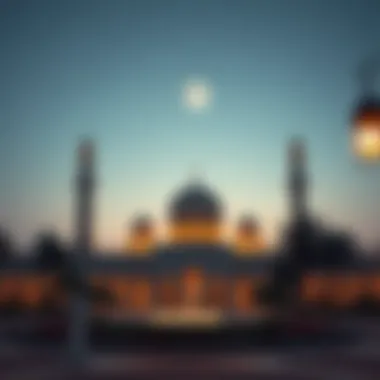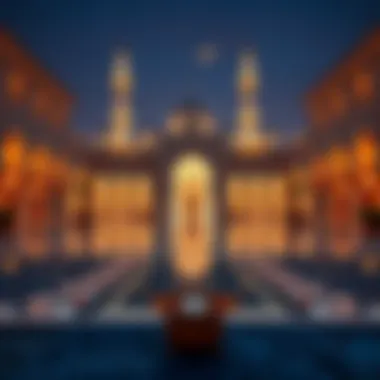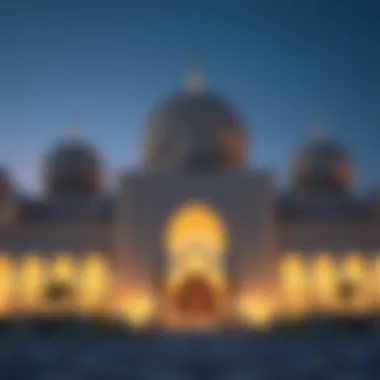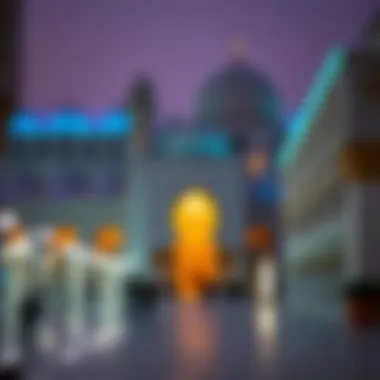Ramadan 2023: Observances and Timings in Dubai


Intro
Ramadan is a month that resonates deeply within the hearts of millions, serving as a time for spiritual reflection, community bonding, and self-discipline. In Dubai, UAE, the atmosphere during this month transforms dramatically. It’s not just about fasting; it’s a blend of traditions, customs, and modern-day conveniences coloring everyday life. The year 2023 is no exception, and the timing of Ramadan will be particularly significant, melding traditional values with the vibrant dynamism of the city.
As residents and visitors navigate through 2023, they’ll observe a unique interplay between the sacred rites of Ramadan and the lively urban landscape of Dubai. Understanding the timing and observances during this month is essential, not only for those fasting but also for expatriates and tourists. This guide takes a comprehensive look at how the month of fasting is observed here, from the early morning Suhoor meal to the breaking of the fast at Iftar, interwoven with insights into local customs and the broader implications for lifestyle and community engagement.
In this article, there will be an exploration of various components of Ramadan in Dubai for 2023. This includes important prayer timings, the impact of fasting on daily life, cultural events that pop up during this time, and the implications for business, particularly in the real estate sector, which sees unique trends during the holy month. With these aspects dissected, both locals and expatriates can glean valuable insights into navigating life alongside the rhythm of Ramadan.
Understanding Ramadan and Its Significance
Ramadan holds a place of profound importance in the cultural and religious fabric of Dubai and the broader Islamic world. This month is not just about fasting; it's an invitation to practice self-control, reflection, and community bonding. It brings forth a period of heightened spiritual activity, where the faithful grow closer to their beliefs and to each other.
The significance of Ramadan transcends mere ritual. Historically, it is believed to mark the month when the Quran was first revealed to the Prophet Muhammad. This connection to spiritual heritage infuses the month with layers of meaning, inviting not just observance but also a deep appreciation of its teachings.
Historical Background
Ramadan has been observed for centuries, rooted in the early days of Islam. Muhammad ibn Abdullah, the Prophet of Islam, received his first revelation during this holy month. The traditions that have arisen since have shaped the livelihoods of millions. What began as a small community practice in 7th-century Arabia has evolved into a global observance, affecting various cultures and societies.
In many regions, Ramadan influenced social structures, catalyzing changes in laws, political actions, and social policies. The reverberations are still felt today, as governments in predominantly Muslim countries adjust public life to fit the observance of Ramadan. This adaptability speaks to the significance of the month, reflecting a timeless commitment to faith and tradition.
Cultural Importance
The cultural significance of Ramadan in Dubai is undeniable. As one of the world’s most cosmopolitan cities, it showcases diverse traditions that coalesce harmoniously. The fasting period is interwoven with local customs, fostering a sense of unity among Emiratis and expatriates alike. During this time, daily life undergoes a subtle yet meaningful shift. Notably, the evening Iftar meals, which break the fast, become extravagant communal feasts, often showcasing an array of local dishes.
Moreover, Ramadan promotes giving and charity, making it a month where many are inspired to lend a hand to those less fortunate. Zakat, a mandatory act of almsgiving, is often fulfilled during this month, underlining the ethical and humanitarian aspects of Islam.
Local festivals and events bloom during Ramadan, with markets and cultural activities that showcase art, music, and traditional performances. The atmosphere buzzes with an aura of togetherness, where preparation for Eid al-Fitr becomes a community affair, blending anticipation with celebration.
Religious Practices
Religious practices during Ramadan are diverse, yet they remain rooted in Islamic teachings. As Muslims begin their day before dawn, they eat a pre-fast meal known as Suhoor, to sustain them through the day’s fast. The act of abstaining from food and drink reinforces discipline and mindfulness, extending beyond just the physical to incorporate spiritual reflection.
Daily prayers become more significant, with many attending evening Taraweeh prayers at mosques. These extended prayer sessions encourage community involvement as they transform into gatherings of collective worship. Reading and reflecting on the Quran is deeply encouraged, enriching spiritual growth and reinforcing faith.
At the end of Ramadan, Eid al-Fitr, the Festival of Breaking the Fast, commemorates the month’s conclusion with communal prayers, feasting, and festivities, marking it as one of the most anticipated moments in the Islamic calendar.
Ramadan is not merely a month of fasting; it's an opportunity to synchronise moral values with daily life, fostering a greater sense of community and personal development.
In summary, understanding Ramadan's significance provides a window into the intertwined nature of culture, history, and religious practices that shape not only Dubai but the world at large.
Ramadan Dates
Understanding the dates of Ramadan is central to both spiritual and practical considerations during this holy month. Ramadan is a time when Muslims around the globe engage in fasting, prayer, and reflection, and knowing when it begins and ends helps in aligning schedules and preparing for observances. In Dubai, a city vibrant with diversity, the significance of these dates extends beyond mere timing; they shape communal and personal experiences alike.
Beginning of Ramadan
In 2023, Ramadan is expected to begin on the evening of March 22. The actual start of Ramadan may vary slightly due to the sighting of the moon, which is a traditional method used to mark the beginning of the month. This time is steeped in ritual; families often gather for prayers, and many individuals spend the evening engaged in community activities or volunteering. Knowing when Ramadan starts allows residents and visitors to prepare for the changes in daily life, thus enhancing their experience.
During this time, you will notice various adjustments across the city. For businesses, particularly restaurants and cafes, hours may shift to accommodate evening gatherings. The atmosphere throughout Dubai transforms, with decorations adorning streets and cultural events being planned, all in preparation for the spiritual significance that Ramadan embodies.
End of Ramadan and Eid al-Fitr
The end of Ramadan is anticipated to be marked by Eid al-Fitr, which is projected to fall on April 21, 2023. This festival brings with it a wave of joy and celebration, as it signifies breaking the fast and a return to normalcy in terms of eating and social activities. The day of Eid al-Fitr is filled with communal prayers, festive meals, and often, family gatherings. It’s a time for giving and sharing, as individuals are encouraged to provide Zakat al-Fitr, a charitable donation designed to assist those in need.


Eid al-Fitr also emphasizes community bonds. Many Dubai residents join together for prayers in open areas or mosques, fostering a sense of unity. The revelry continues with cultural events throughout the city, featuring performances, exhibitions, and food festivals that celebrate both local and international traditions. In essence, end of Ramadan and Eid al-Fitr is not just a conclusion of fasting—it is a celebratory bridge back to communal life, inviting both locals and expatriates to participate in and appreciate the rich cultural ambiance of Dubai.
"The beauty of Eid al-Fitr lies not just in the feast, but in the reminder of community and compassion that transcends borders."
As Ramadan 2023 approaches, it brings with it a unique opportunity for dialogue, understanding, and cultural appreciation among residents and visitors in Dubai. Keeping an eye on the precise dates lays the foundation for an enriched experience during this significant month.
Ramadan Timing in Dubai
Understanding the timing of Ramadan in Dubai is essential for both residents and visitors. This month of fasting, prayer, and community reflection is pivotal in shaping the lifestyle and daily rhythms of life in the UAE. For many, it’s not only a spiritual journey but also a period that brings about significant changes in social interaction, work, and leisure activities. By being aware of the timing nuances, individuals can navigate their daily lives with greater ease, respect, and understanding of local customs.
Fajr and Maghrib Prayer Times
During Ramadan, the days begin with the Fajr prayer, which marks the start of the fasting period. In 2023, the Fajr prayer in Dubai will be approximately at 4:45 AM, depending on the day. It is a time when Muslims prepare for the fast, often eating a pre-dawn meal known as Suhoor. This meal is integral; it serves as nourishment until the sun sets.
When the sun dips below the horizon, Muslims gather for the Maghrib prayer around 6:54 PM. This marks the end of the fasting day. The act of breaking fast is often celebrated with dates and water, following the tradition of the Prophet Muhammad. Understanding these timings helps non-Muslims to respect the practices, and integrates everyone into the rhythm of the community.
"Being aware of prayer times fosters a deeper respect for the traditions that make Ramadan special in Dubai."
Impact on Daily Routines
The impact of Ramadan on daily routines is profound, shifting from the usual hustle and bustle to a more contemplative state. Work hours for many businesses are adjusted to accommodate the needs of those who are fasting. Typical office hours may run from 9 AM to 3 PM, giving employees time to prepare for Iftar, which is the evening meal after sunset.
Eating and drinking in public during the fasting hours are considered disrespectful in Dubai. Hence, most cafes and shops choose to respect the customs by closing or having discreet service. This atmosphere fosters an impressive sense of community spirit as individuals gather for Iftar in mosques, homes, and restaurants, sometimes offering food to those less fortunate, making this period not just about personal sacrifice but also about charity and unity.
Consider checking out additional resources on Ramadan practices on Britannica for a broader context.
For prayer times and community activities, refer to local mosque websites or community boards.
Local Customs and Traditions
Understanding local customs and traditions during Ramadan is vital for a comprehensive grasp of how this sacred month is observed in Dubai. For both residents and visitors, the cultural texture woven into everyday life during Ramadan adds depth to the experience of fasting and community involvement.
Iftar Practices
Iftar, the meal to break the fast, stands as a premier highlight of Ramadan in Dubai. As the sun sets, the call to Maghrib prayer resonates, marking the end of a day of fasting. Families, friends, and even strangers gather, creating a sense of togetherness that is palpable in the air.
Local restaurants, hotels, and food vendors offer lavish Iftar buffets featuring a mix of traditional Emirati and international cuisines. Dates and water are often the first items consumed, paying homage to the Sunnah of the Prophet Muhammad.
Beyond mere consumption, Iftar becomes a shared experience that strengthens social ties. Many locals prepare extra food to share with neighbors, reflecting the spirit of generosity that is emblematic of the month. If you are visiting, you may find yourself invited to partake in these communal meals, an opportunity not to be missed, as it fosters bonds that transcend cultural barriers.
Community Gathering
The spirit of community during Ramadan is palpable throughout Dubai. Different city corners come alive with celebratory gatherings centered around Iftar. Numerous communal events take place in public parks and mosques, inviting anyone willing to join.
Events often include various cultural showcases, traditional music, and even storytelling sessions that dive into the rich history of Ramadan. Such gatherings not only emphasize the value of inclusivity but also spark dialogues among diverse cultures, making it a truly cosmopolitan celebration.
In these gatherings, the essence of belonging is emphasized. Whether you're an expatriate or a local, there’s a warm welcome waiting for everyone, enhancing understanding among different communities.
Charity and Zakat
Charity, or Zakat, is a cornerstone of Ramadan. Muslims are encouraged to be more mindful of their social responsibilities and to assist those in need. During this month, many individuals and organizations ramp up their charitable efforts, organizing campaigns to provide food and essentials for underprivileged communities.
“The charity done in Ramadan is like no other.”
In Dubai, platforms for donating are numerous and easily accessible, from community kitchens that provide meals to those in need to fundraisers that support various charitable causes. Individuals often set aside contributions annually, but during Ramadan, this practice becomes a priority, driven by a desire for greater good and a hope for spiritual elevation.
Understanding how charity functions during Ramadan is not just about the act of giving; it’s about fostering a culture of empathy and unity. Both residents and visitors can partake in these charitable acts, feeling a sense of fulfillment that comes from aiding others.


Dining Etiquette During Ramadan
Understanding the dining etiquette during Ramadan is essential for anyone engaging with the vibrant community in Dubai. This month is not just about abstaining from food and drink; it’s also a time for reflection, community bonding, and respect for the customs surrounding fasting. Moreover, comprehending these practices aids in fostering mutual respect among residents and tourists alike.
Public Conduct
Dubai throbs with life, yet during Ramadan, a certain decorum prevails, especially in public spaces. Non-Muslims are advised to be particularly mindful of their actions, keeping in mind that many around them are fasting from dawn until sunset. Here are a few key points to consider:
- Eating in Public: It is generally frowned upon to eat, drink, or smoke in public during the daylight hours of Ramadan. Restaurants might cater to those not observing the fast, but many will close their doors until Iftar - the evening meal that breaks the fast. If you are in a public area, it’s polite to keep snacks or beverages out of sight.
- Dress Code: Modesty is vital. Dressing respectably helps maintain the dignity of the observance. While Dubai is quite liberal compared to other places in the region, this month calls for more conservative attire.
- Quiet and Discretion: Noise levels should be kept low. Consideration for those fasting is paramount; respect their journey through the month by being mindful of your volume.
"During Ramadan, our collective patience and understanding cultivate a bond that shines brightly across cultures."
Private Observances
Private dining observances during Ramadan offer a chance to deepen personal connections and reflect on the true essence of the month. Here’s a glimpse into what occurs behind closed doors:
- Iftar Gatherings: For many families, the Iftar meal is a cherished tradition. It’s common to invite friends and family over to share a meal at sunset. The meal often begins with eating dates and drinking water, following the Sunnah - a practice from the life of the Prophet Muhammad. As guests, it’s customary to bring a small gift, like sweets or fruit, as a token of appreciation.
- Prayers Before and After Meals: Many households will engage in prayers before starting the meal, enhancing the spiritual atmosphere. After eating, the encouragement to reflect on the day and give thanks becomes stronger.
- Food Variety: While traditional dishes play a vital role during this month, the fusion of culinary cultures is evident. Homes might serve everything from laban (yogurt drink) to biryani, showcasing the diverse backgrounds of residents.
For further insights into Ramadan practices, you might visit Britannica or Wikipedia for a broader understanding.
Ramadan Activities and Events
Ramadan in Dubai is more than just a month of fasting; it is a blooming season of activities and events that bring the community together, offering both spiritual enrichment and social engagement. The importance of these activities cannot be overstated, as they not only enhance the festive spirit of the month but also provide a platform for education and interaction among individuals from different backgrounds. Locals and expatriates alike are often immersed in a series of events that transcend mere observance of the fast; they foster unity and mutual respect.
Cultural Events
During Ramadan, Dubai pulsates with diverse cultural events that celebrate the richness of Emirati tradition and Islamic heritage. From art exhibitions to music performances, cultural events often take place at venues like Alserkal Avenue, the Dubai Opera, or even open-air markets. These gatherings nurtur a sense of belonging and offer insights into the customs surrounding Ramadan, showcasing local artists and craftsmen.
- Iftar Festivals: Many hotels and community centers hold iftar festivals where people gather to break their fast together. These events provide a chance to sample a variety of traditional dishes, such as harees, sambusas, and dates, often complemented by refreshing drinks.
- Madrasa Workshops: Educational workshops for all ages offer lessons in Arabic calligraphy, henna art, and traditional Emirati cooking during this sacred month. This not only delights attendees but also keeps culture alive.
Such occasions don’t merely represent an opportunity for entertainment; they enable communities to weave a rich tapestry of experiences that echo the tenets of compassion and togetherness that Ramadan embodies.
Religious Gatherings
Religious gatherings during Ramadan hold profound significance as they provide spaces for spiritual growth, prayer, and reflection. These gatherings often encompass a variety of communal activities that invite deeper engagement with one's faith.
- Taraweeh Prayers: These additional prayers held during the nights of Ramadan offer devotees the chance to listen to selected portions of the Qur'an being recited in congregation. Many mosques, such as Al Farooq Omar Bin Al Khattab Mosque and the Grand Mosque, are particularly popular for these prayers. They create profound connections among worshippers and strengthen community bonds.
- Qur'an Recitation Competitions: Events where participants recite verses from the Qur'an in a manner that is both respectful and melodious are organized across various locations. They encourage not only participation but also a collective appreciation for the holy text.
- Charity Drives: Charity plays a crucial role in Ramadan, and numerous community gatherings are organized specifically for this purpose. Fundraisers aimed at supporting the less fortunate, often held in mosques or community centers, demonstrate unity and compassion.
"In Ramadan, every act of kindness and community engagement fills the air with a unique spirit that transcends the barriers of backgrounds and beliefs."
Engaging in these religious gatherings fosters a deeper understanding of the spiritual fabric that Ramadan represents, making it a month of profound personal and communal transformation.
To sum it all up, the myriad of activities and events during Ramadan in Dubai serves to foster a greater sense of belonging and community. These observances not only honor traditions but also invite visitors and residents to partake in the unique cultural narrative of the UAE. While the holy month invites introspection, it simultaneously opens doors to shared festivities, making it a truly remarkable phase of the year.
Impact of Ramadan on Real Estate Market
The observance of Ramadan holds significant sway over various sectors, and the real estate market is no exception. In Dubai, where the harmonious blend of tradition and modernity thrives, the impact of this holy month can be seen in fluctuating market trends, increased demand, and shifting buyer behaviors.
As investors and developers look to navigate this period, understanding the nuances of how Ramadan affects real estate operations becomes crucial. For example, many expatriates opt to renew leases or purchase properties during Ramadan, drawn to promotional deals and financing options that often emerge during this time. Additionally, the festive spirit fosters a sense of community, prompting more family-oriented buyers to seek larger properties to accommodate gatherings.
Ramadan influences the market not just through sales and rentals but also through shifts in investment strategies. Many investors might put a pause on aggressive buying, preferring to wait until the holiday is over to ensure that any transactions align with the rhythm of the market post-Ramadan. This can present opportunities for savvy buyers who are ready to make decisions when competition is at its seasonal low.
Market Trends During Ramadan


- Rental Market Activity: During Ramadan, there is often an uptick in interest for rental properties, especially in areas that are close to mosques or community centers. Families are inclined to move ahead of Eid, ensuring they have space for celebrations.
- Sales Trends: Property sales typically slow down during the fasting month, with many potential buyers deferring their decisions until Eid al-Fitr. However, this lull can be advantageous for those willing to buy, as sellers may be more flexible in negotiations due to reduced activity.
- Promotions and Offers: Many real estate agents and developers capitalize on the spirit of Ramadan by offering special promotions such as zero down payments or discounted lease rates. These deals, if marketed appropriately, can lead to a surge in inquiries, particularly among those looking for a deal.
These trends suggest that while Ramadan might temper some activities, it also creates a unique environment for strategic movements in the market.
Investment Opportunities
With Ramadan often presenting a more subdued market atmosphere, astute investors can seize several opportunities:
- Identification of Undervalued Properties: As many buyers step back, savvy investors have the chance to identify undervalued properties that may have gone unnoticed in busier times.
- Long-term Rentals: Investors can focus on acquiring long-term rental properties, given the surging demand post-Ramadan from families looking to settle in before the education year begins.
- Community-centric Projects: There’s an increasing interest in investing in properties that cater to community needs, such as those that include amenities for gatherings and events, given the cultural significance of community during Ramadan.
Engaging with market dynamics during Ramadan can yield promising results for those willing to act with intent and insight. Investors should remain attentive to local sentiments and market shifts, as these will serve as indicators of both immediate and long-term potential. In Dubai's evolving landscape, leveraging the unique characteristics of Ramadan can turn challenges into lucrative opportunities.
Travel Considerations for Ramadan in Dubai
Traveling to Dubai during Ramadan offers visitors a unique glimpse into a culture rich in tradition, faith, and communal spirit. However, being mindful of the specific customs and regulations during this holy month can enhance the experience and ensure respect for local observances. When planning a trip to Dubai in 2023, understanding how Ramadan shapes daily life and leisure activities is crucial.
Visitor Guidelines
Visitors to Dubai should be well-informed about the expected behavioral norms during Ramadan. Fasting from dawn to sunset is a fundamental aspect of the observance. As such, non-Muslim tourists are also encouraged to show consideration by refraining from eating, drinking, or smoking in public during fasting hours. This practice is not merely a suggestion; it's an accepted protocol.
"Respecting the local beliefs goes a long way in making your stay enjoyable and enriching."
Though there are designated areas where eating and drinking are allowed, primarily in hotels and private spaces, overall discretion is encouraged. Travelers should also note that restaurants may operate on limited schedules, with many opening only after sunset, creating a vibrant atmosphere for the evening meals.
For tourists uncertain about guidelines, hotels and resorts offer excellent resources. Many establishments prepare special packages, including Iftar dinners after sunset, allowing guests to indulge in delectable local cuisine while experiencing the sense of community that flourishes during this time.
Moreover, it’s vital to consider travel schedule adjustments as some shops, services, and attractions may have altered hours. A valid approach is to plan sightseeing and activities for the evening or the early morning, aligning more closely with the local customs.
Accommodations and Services
Choosing the right accommodation during Ramadan in Dubai could greatly impact the overall travel experience. Many hotels, especially those catering to international guests, remain flexible. Several offer tailored services like early breakfast (Suhoor) in preparation for the day ahead and Iftar buffets that feature a variety of international and local dishes.
When booking accommodations, it's advisable to look for establishments that clearly communicate their Ramadan offerings. Some hotels may additionally provide shuttle services to places of worship for those interested in attending Taraweeh prayers, which are conducted nightly in mosques.
Several local initiatives also sprout during Ramadan, such as community iftar gatherings at major hotels and public spaces. These events not only promote social cohesion but also offer travelers a chance to taste traditional dishes and interact with locals. It's worth noting that the level of hospitality during this month is often amplified, showcasing the warmth and generosity deeply rooted in Emirati culture.
Lastly, being aware of health services and amenities is essential for a comfortable stay. Some facilities may have adjusted hours during Ramadan; however, major hospitals and emergency services operate as usual. Understanding access to these services helps ensure peace of mind throughout the visit.
By being mindful of the specifics about travel considerations for Ramadan in Dubai, guests can embrace the spirit of the month while making lasting memories.
Closure
The conclusion of this article serves as a pivotal point for understanding the essence of Ramadan in Dubai, particularly focusing on how this holy month profoundly affects daily life, social structures, and the economy. By dissecting the various elements relating to Ramadan, we gain deeper insights into its significance beyond mere fasting. It reveals cultural nuances, enriches community bonds, and enhances spiritual consciousness.
Summary of Key Insights
To summarize the key points discussed:
- Cultural Significance: Ramadan is not just a time for fasting; it’s a period for introspection, community gathering, and charitable acts. Events like iftar foster togetherness and are vital in strengthening social ties among families and friends.
- Economic Impacts: Retail and hospitality sectors often experience a surge during Ramadan, as special events and promotional offers cater to both locals and tourists. This has implications for the real estate market as well, as people look to invest in properties that allow them to fully partake in the Ramadan atmosphere.
- Adaptation for Non-Muslims: Understanding local customs during Ramadan sensitizes expatriates and visitors to the cultural fabric of Dubai, encouraging an atmosphere of respect and learning. This contribution fosters goodwill and mutual respect within the diverse community.
The Ongoing Relevance of Ramadan in Dubai
The relevance of Ramadan in Dubai continues to evolve, marrying tradition with modernity in a city known for its rapid development. Here, Ramadan serves not only as an observance for Muslims but as a conduit for intercultural exchange.
As Dubai progresses, it invites more expatriates from around the world, each bringing unique traditions and perspectives. This fusion creates a rich tapestry of cultural exchange, which can be notably felt during Ramadan. The spirit of sharing and understanding promotes multiculturalism and enhances community cohesiveness. Furthermore, institutions like the Dubai Islamic Affairs and Charitable Activities Department work tirelessly to promote charitable initiatives that resonate with core Islamic values, thereby fostering an environment of giving and compassion.
In summary, Ramadan remains a crucial thread in the societal fabric of Dubai, influencing economic trends, societal norms, and cultural understandings. Its enduring significance informs both daily living and broader communal interactions, making it an essential aspect of life—not just for Muslims, but for everyone in this vibrant city.
"Ramadan is a bridge; it connects believers, cultures, and communities, creating pathways that enhance mutual respect and understanding."
In the end, Ramadan encapsulates the essence of communal harmony, evolving with each passing year to reflect the dynamic nature of Dubai itself.







